Stata vs R
No Bayesian analysis this week, instead I want to talk more generally about statistical computing. I think that this discussion follows on naturally from my recent postings about linking Stata and R. As you might imagine I am quite a fan of Stata, but not one who is blinded to its limitations and for a […]
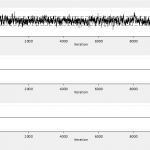
Adaptive MCMC
The Stata Journal has not published very much on Bayesian statistics, so I was delighted to see the article by Matthew Baker in the latest issue (Stata Journal 2014;14(3):623-661). Matthew describes a Mata program for adaptive MCMC and his paper has encouraged me to discuss this topic. You should certainly read that article alongside this blog. I […]
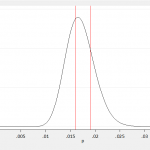
Solutions to the Exercises: Chapter 3 – Question 2
Last time I presented my solution to the first question at the end of chapter 3 of ‘Bayesian analysis with Stata’ and this time I want to consider question 2 from the same chapter. Question 2 This question analyses some data on the prevalence of very pre-term births (VPT) in Europe using a small 1997 […]
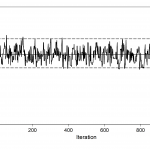
Solutions to the Exercises: Chapter 3 – Question 1
This is another of my occasional postings working through the exercises given at the end of the chapters in ‘Bayesian analysis with Stata’. Chapter 3 introduces the Metropolis-Hastings sampler and so enables us to tackle any small sized Bayesian analysis. For larger problems this method can be too slow and faster algorithms are needed. Despite […]
Using R with Stata: Part IV
This is the last in a series of posting about using conducting advanced statistical analyses in Stata by sending a job to R and then reading the results back into Stata. I have spent a while on this topic and although I believe it to be very important, next time I want to return to […]
Using R with Stata: Part III
This is another in a series of posting about using conducting advanced statistical analyses in Stata by sending a job to R and then reading the results back into Stata. Our task for testing this process is to use the R package DPpackage to fit a Bayesian Dirichlet process mixture (DPM) model for smoothing a […]
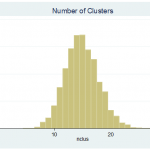
Using R with Stata: Part II
This is the second in a series of posting about conducting advanced statistical analyses in Stata by sending a job to R and then reading the results back into Stata. Our task for testing this process is to use the R package, DPpackage, to fit a Bayesian Dirichlet process mixture (DPM) model for smoothing a scatter plot. […]
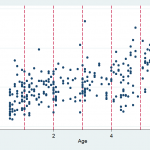
Using R with Stata: Part I
In the posting before last I mentioned that there are many R packages that perform advanced statistical analyses for which there is no equivalent Stata command. In particular, I referred to the R package, DPpackage, that fits a range of Bayesian models with Dirichlet process priors. Then in my last posting I introduced a problem […]
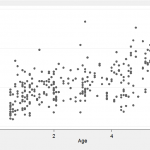
Smoothing a scatter plot
In my last posting I mentioned that in is possible to use Stata to run R packages by preparing an R script, calling R from within Stata so that R runs in the background and then reading R’s results into Stata for further processing. The big advantage of this method is that one does not need to […]
Stata and Advanced Statistical Methods
My recent postings have been on Bayesian non-parametric analysis with Dirichlet processes and they have raised a couple of questions in my mind that I should now like to discuss. Is Stata a suitable vehicle for advanced statistical analysis? and if so, Who should do the programming? Dirichlet processes (DPs) provide very flexible Bayesian priors with […]


 Subscribe to John's posts
Subscribe to John's posts
Recent Comments